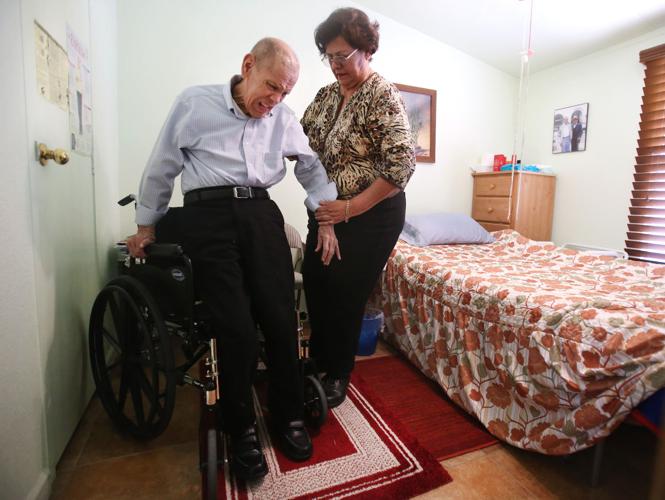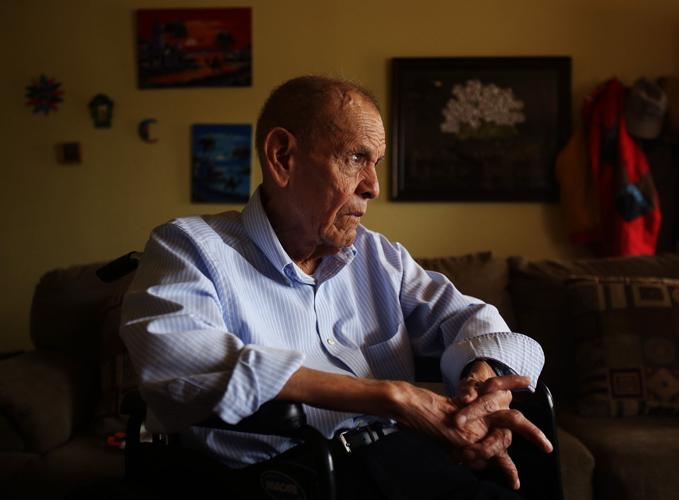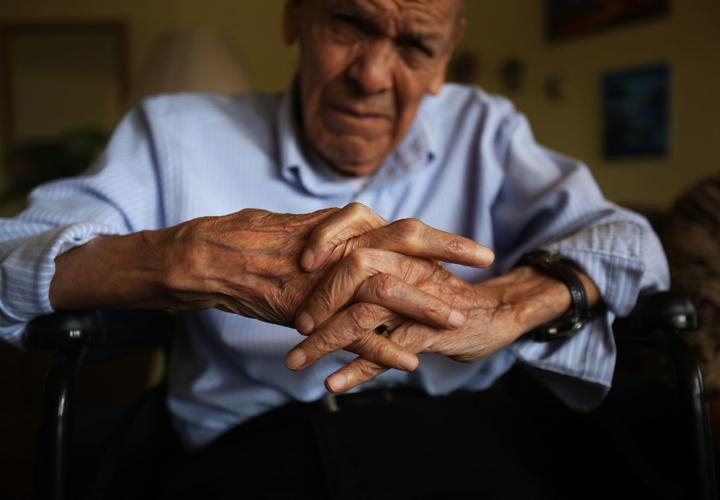Eduardo Luna is betrayed by his body.
At 88, his mind still sharp, he sits in a wheelchair, hands clasped tightly, a fixed expression and his mouth agape.
Today is World Parkinson’s Day, acknowledging the fight over the disease that has laid claim to Luna’s mobility and social interactions over the last 20 years.
Before his diagnosis, Luna was a telegrapher for 45 years in Magdalena, Sonora. A father of five, his wife died before he was diagnosed with Parkinson’s.
The chronic illness is caused by the death or deterioration of brain cells in charge of producing dopamine, leading to problems with regulating movement, body control and emotions.
The U.S. has about 1 million diagnosed cases of Parkinson’s, but experts believe there are many more.
Luna lives on Tucson’s south side with his daughter, Leticia Luna, who makes digital blueprints for houses and businesses and is currently getting a certification at Pima Community College.
Even though helping her father get dressed, putting him to bed, bathing him and getting him into the car can be an exhausting routine, Luna, 60, says it’s harder emotionally than physically.
“It’s not the same to have a customer than taking care of your dad,” she said.
Luna listens without looking at her. His hands are busy trying to put the cap back on a water bottle. When he drank, he grasped the bottle with both hands, tilted his head back and closed his eyes tightly, concentrating on keeping control.
While Parkinson’s patients often exhibit tremors, Luna’s hands are relatively steady, thanks to a surgical procedure he went through five years ago.
Called deep brain stimulation, it is used to treat the shaking, the rigid and slow movements and the difficulty in walking.
Not too long ago, the surgery was performed only in advanced-stage Parkinson’s patients, said Dr. Francisco Valdivia, a neurologist from the Center for Neurosciences in Tucson. But it was recently discovered that the procedure could help with the progression of the disease.
The surgery consists of the installation of a medical device similar to a pacemaker. A thin electrode sends electrical stimulation to specific areas of the brain that are in charge of movement. The electrode also blocks the signals that cause the tremors.
A small opening in the skull is made to insert the cable, which runs under the skin to the neurostimulator, a small box the size of a stopwatch implanted near the clavicle, chest or abdomen , where Luna has his.
“It left me in great shape,” he says.
For his daughter, it was almost like a miracle.
“The next morning from the surgery, my dad got up without shaking,” she says. “I started crying.”
The procedure does not stop the disease from advancing, Valdivia said. Adjustments might be needed, and it could stop working.
Last August, Luna’s neurostimulator was replaced. But the opening in his chest did not heal well and got infected.
They had to wait a month and a half. His tremors returned, and he was depressed.
In December, doctors placed the device in his abdomen. It works, but Luna has had some complications. He does not walk as much as before. Luna also takes Levodopa, the most common medication to treat late stages of Parkinson’s.
Luna used to enjoy going out to walk. He also loves eating in restaurants. Olive Garden is his favorite. But he does not go out as much as he used to.
“I think my situation is getting worse,” he says.
Leticia Luna thinks that even though it’s been hard, they have seen more positive results. “Even with your symptoms, you are still here,” she tells her dad.
Both have learned much about Parkinson’s disease. They participate in activities at the Muhammad Ali Parkinson Center in Phoenix. Luna was a member of the Parkinson Wellness Recovery Gym or PWR!Gym in Tucson, which specializes in Parkinson’s patients.
Luna likes to read. He has learned some English by watching TV and with a language course he began 10 years ago when he moved to Arizona.
“He knows a lot, he is very smart,” says his daughter. “He is my dictionary.”
Now that his movements have decreased, the presidential elections keep him entertained.
“I am so sick of Donald Trump,” Luna says. He says he voted for Hillary Clinton in the state’s recent Presidential Preference Election because she will support genetic medical research.
His daughter says, “He is still waiting for scientists to find the cure.”






